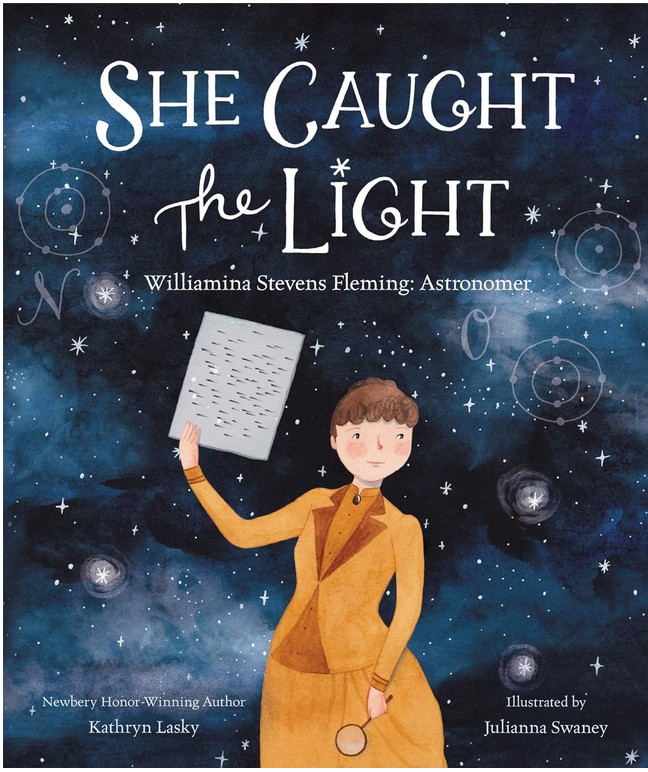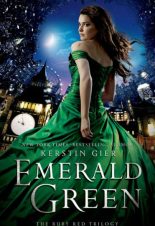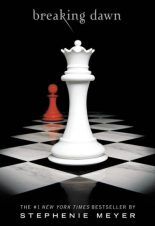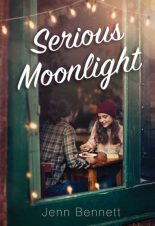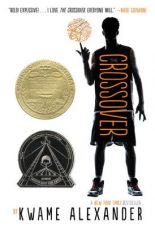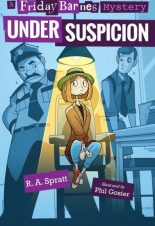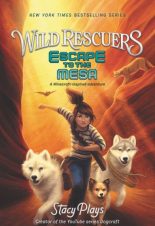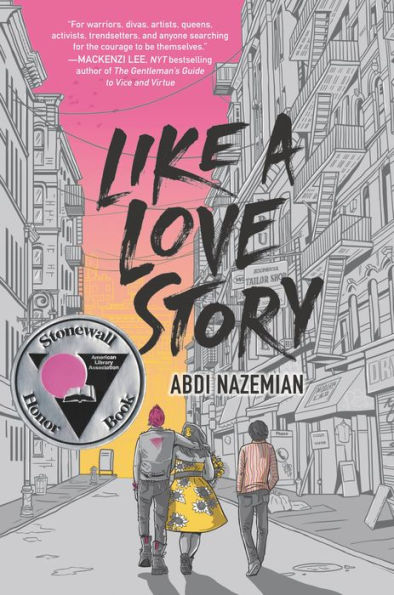
Buy This Book
“I want to contribute something. To capture all this, so that a hundred years from now, or a thousand years from now, people will remember it all and know that we existed. That we lived,” Art. —Like a Love Story
Like a Love Story
by Abdi Nazemian
AR Test, Diverse Characters, Teaches About Culture
13+
Score
4.5
432
Like a Love Story takes place in New York City in the late 1980s. The AIDS crisis is devastating gay communities, and activists are protesting the government’s reluctance to extend research or support to those affected. The narration rotates between three teenagers: Reza, Art, and Judy.
Reza is new in town, having recently immigrated to New York from Iran, where his family escaped a violent revolution. In the closet with a nearly hypochondriac fear of AIDS, Reza starts at a new school and soon meets Judy and Art, who have been best friends since childhood. Both Judy and Art are committed to gay culture and gay activism under the tutelage of Judy’s uncle Stephen, an AIDS patient and well-known member of the gay community. Art is an out-and-proud gay teenager, who is assertive and upfront about his identity. Brash and unafraid, Art is full of anger at the injustice of the AIDS crisis. Judy, a straight girl who shares Art’s love of Madonna and fashion, supports him in everything and shares his love of fashion and film.
A romance develops between Reza and Judy. But Reza, a closeted gay, knows he can only hold out for so long before his secret comes out. The first two acts of the novel largely concern their false relationship, eventual falling-out, and then the ensuing romance between Reza and Art. Each of the three narrators has a fairly equal stake in the plot, and each brings their own narration, perspective, and personality to the story. Like a Love Story is largely a coming-of-age story, but it is really three coming-of-age stories as each character grapples with their sexuality, their future, and their imminent emergence into the adult world.
Like a Love Story is essential reading for anyone who wants to learn about the AIDS crisis or the origins of the modern gay rights movement. Without preaching or lecturing, the narrative paints a rich and engaging portrait of the political climate through its three narrators. Each character in Like a Love Story has a completely unique voice; readers can open the book to any page and immediately know who is speaking.
Regardless of their own identities, readers will see themselves in the characters because of how authentically they are portrayed. Each character has uncertainty about their place in the world, an imperfect relationship with their parents, a faulty understanding of how the world works, and a yearning to belong—and readers get to see them grow as the story progresses.
Like a Love Story has some of the most compelling adult figures in a genre where adults are often one-dimensional and cast to the side. The relationship that each teen has with their parents is complicated and imperfect, but masterfully written. It is genuinely heart-wrenching to see Art’s interactions with his homophobic parents, and it is genuinely moving to see Judy’s conversations with her mother evolve throughout the story.
Like a Love Story does not shy away from sexual content and depictions of sex acts, but it’s one of the few books that feels justified in its usage. Characters frequently talk of condoms and bodily fluids. The mechanics of AIDS transmission and the effects of the disease are explained as Uncle Stephen succumbs to infections. Readers who pick up this book in 2020 will already know the ending to some extent. Thanks to modern medicine, many people today can live full lives with HIV and new pharmaceuticals can help prevent transmission. However, the characters don’t know this, and they can only grieve the dead and dying members of their community while fighting for rights and recognition. The story highlights the importance of community, activism, and love.
Sexual Content
- When asked how he knew he was gay, Art says, “I had a wet dream about Morrisey.”
- During a make-out session, Judy tries to find out if Reza is aroused. “As nonchalant as I can, I move my hand down, feeling his crotch. I feel something hard. Is it him, or is it his zipper? I can’t even tell. I’ve never felt a hard-on before.”
- Judy thinks, “Art told me once that the subway was the hottest place in the city, as in sexual heat, not physical temperature. He said that all those bodies rubbing against each other basically made it a clothed, co-ed bathhouse.”
- Reza sees a naked male mannequin in a store window and thinks, “I look at the mannequin’s body and find myself getting a little hard. I cover my crotch with my hands. I imagine that Art is the mannequin, standing in the store window naked. How sick do you have to be to be turned on by a piece of plastic?”
- After Reza sees a photo of Art, Reza thinks, “I need to stop thinking about him, and I know there’s only one way to do that. I lie back on my bed, close my eyes, and unzip my pants. I see Bartholomew Emerson Grant VI come to life, enter my room, climb into bed with me. He kisses me, undresses me, tells me not to be scared. But then he’s gone, and all I see are images of dying men with lesions.”
- A big part of the second half of the plot is Reza’s shame and paranoia surrounding his sexual desires. Stephen teaches Art and Reza about safe sex and about how to use condoms safely. Stephen tells them, “If you want a tutorial, we can go home and practice with bananas. . . Lube is lubricant. Men need it, because we don’t naturally get wet down there . . . the jury is out on whether oral sex is safe or not, but my advice is to use a condom for that too.”
- Stephen says, “The straight world has defined losing your virginity as intercourse. That’s their thing. But we get to define it for ourselves. And you never, ever have to do anything you don’t want to.”
- Reza thinks, “I hate those words. Oral. Anal. I hate how graphic they are, how hostile they feel.”
- In a photography darkroom, Art takes off his clothes for Reza. “There’s only one thing to take off. My boxer briefs. I remove them. I stand in front of him, exposed.” They kiss, but don’t do anything else.
- Judy has an intimate moment with Reza’s brother, Saadi. As Judy makes out him, “It’s furious. Our tongues explore each other. Then his hands are all over me… his breath is heavy, and his hips are thrusting urgently. I feel what I never felt when Reza and I kissed, an erection. Saadi is so hard. He sits up and takes his polo off.” They don’t go all the way. “He wants to have sex, but I tell him I’m not ready.”
- Art says, “The first time I read porn, I was twelve. I found my dad’s stash of Penthouse and Playboy magazines in the back of his closet. But Penthouse has these sex stories in them, and they were very hot because there were men in them.”
- The characters all go to a Madonna performance wherein she masturbates onstage. The act is not described in detail.
- When Art and Reza finally consummate their relationship, they use condoms and lube. Reza wraps “my legs around him, pulling him closer to me, or deeper into me, because he’s in me now. We thrust and grunt and sweat until we almost fall off the bed.” The scene takes up about three pages, but it is mostly dialogue and doesn’t go into more physical detail.
Violence
- While attending a protest, Art hears bystanders say, “Hose those faggots down. They like that.”
- During a protest, police officers “yank Art away and handcuff him.” The other police officer “pushes Reza to the ground.”
- Some bullies begin to taunt Art, and he reacts violently. “My fingers tense into a fist. Before I know it, I leap out of my seat and tackle Darryl to the ground, taking him down like I’m one of the gorgeous ladies of wrestling. ‘Go to hell, you fucking ASSHOLE!’ I scream as he writhes below me, his scared, beefy body stronger than mine but unable to overpower the force of my rage. ‘Get off me, fag!’ he yells. ‘Not until I give you AIDS,’ I say, and I spit on his face.” Art describes later, “I pull Darryl’s foot toward my face. He pushes his leg up, kicking my chin hard in the process. My teeth hit my lips. My head doubles back, hits the wall with a thud… My eyes flicker with the shock of pain. When I open them, I see blood on my hand and on my shirt.”
Drugs and Alcohol
- At a party with some kids from school, Judy gets “drunk on fruit punch.” Her friend tells her, “You don’t want your parents to see you like this.”
- When Uncle Stephen is on his deathbed, he asks for a glass of wine. Judy’s mom pours wine for him and a small glass for Judy.
- Uncle Stephen has been taking morphine for his pain; by the time he dies, his bottle of morphine is empty.
Language
- Profanity is used frequently. Profanity includes: fuck, shit, hell, ass, and damn.
- “Oh my God” is often used as an exclamation.
- Art is determined to reclaim the words “faggot” and “fag,” which is a recurring point throughout the story. Judy’s mom asks Art not to use the word because “I heard that word hissed at my brother like a dagger throughout his childhood, and I don’t want to hear it ever again.” They eventually agree to disagree.
- After coming out, Reza has “heard every possible word a homosexual could be called . . . Faggot. Pansy. Mary. Butt pirate. Fruit. Turd burglar. Flamer. Nancy. Queen.”
Supernatural
- Art can see “auras.” Readers might recognize them as a condition called synesthesia, but to Art they take on a spiritual and artistic significance. Art doesn’t “snap a photo unless I see its energy. I know they’re all black-and-white, but they have colors to me. Auras.”
Spiritual Content
- Art says, “I think that if it weren’t for all the bullshit rules of Catholicism, then there would be no Madonna, because what is she if not a rebellion against all of this?”
- In a church, Art thinks, “I don’t want to burn this place to the ground. What I want is to make them see that I AM HOLY. These thoughts of me and Reza, they are holy.”
- A priest’s homily “makes multiple references to protecting ‘the unborn.’” Art thinks, “It’s amazing how gung-ho he is about saving the lives of fetuses, but then he turns a blind eye to all the actual humans DYING right in front of him.”
- Art lights prayer candles in a church and thinks, “I know that I don’t believe in a God who can grant wishes, but if there’s even a chance that such a God exists, then I have some wishes I’d like granted.” He wishes for AIDS to be cured.
by Caroline Galdi
“I want to contribute something. To capture all this, so that a hundred years from now, or a thousand years from now, people will remember it all and know that we existed. That we lived,” Art. —Like a Love Story
Latest Reviews

Goodbye Days

Medusa
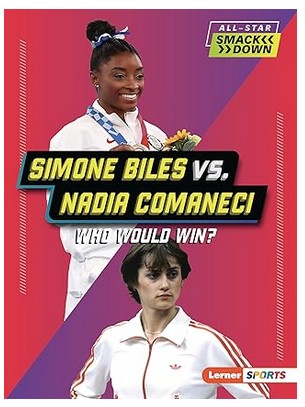
Simone Biles Vs. Nadia Comaneci: Who Would Win?

A Manatee Calf Grows Up
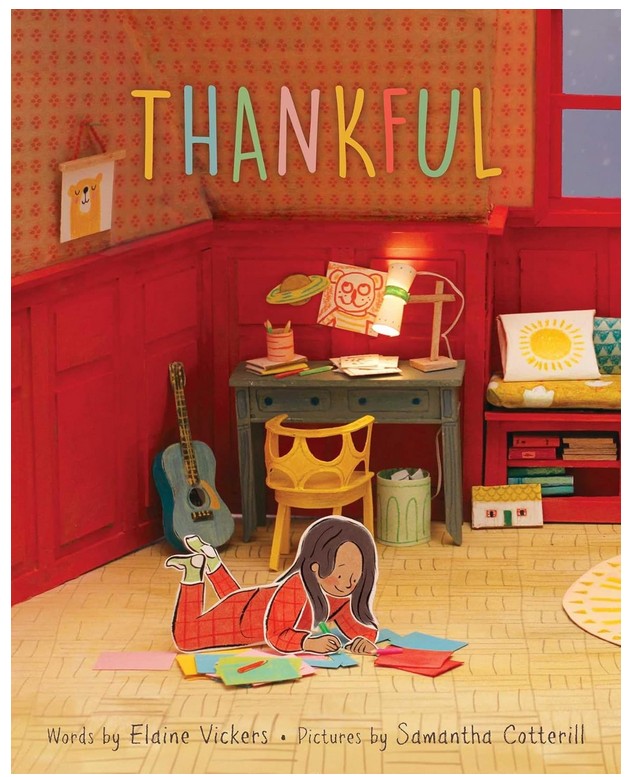
Thankful
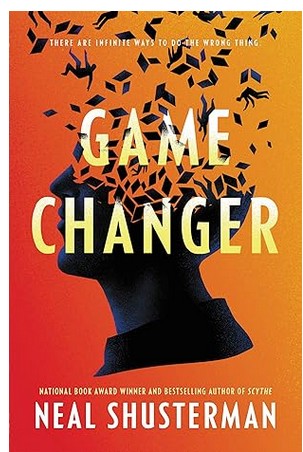
Game Changer
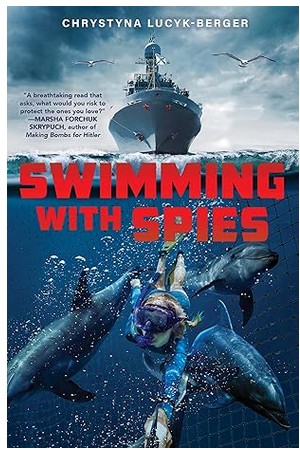
Swimming with Spies
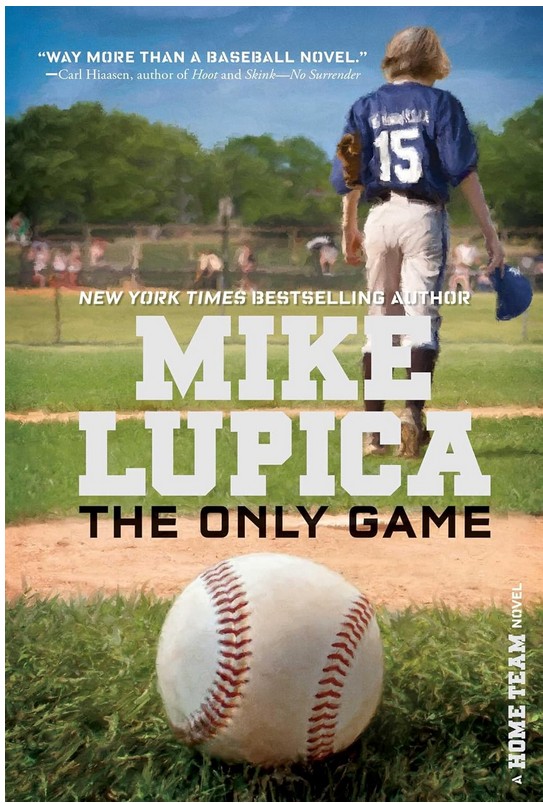
The Only Game
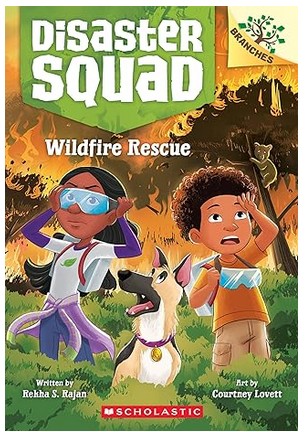
Wildfire Rescue
